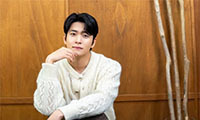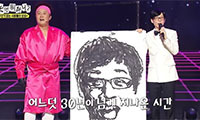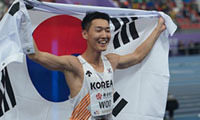Korean Students Association in Berkeley - A New Image Through Cultural Awareness
▶ By Ji Hyun Lim
"That reputation has negative connotations", says K.S.A.Vice President Jayon Kim, a senior at U.C. Berkeley.
A member since freshman year, Jayon Kim says he wants to project the positive aspects of the club. "Older students took care of you, showed you around campus, bought you dinner, gave you advice. They were like hyungs [older brothers] and nunas [older sisters]" says Kim.
The new KSA staff at U.C. Berkeley is aiming to clarify their goals to the Berkeley campus and community as a community-based organization that emphasizes strength in cultural roots and familial relationships amongst the members.
"The organizations is evolving and has evolved since it first began" says Henry Kim, the KSA President. In the late 1960’s Korean Students Association began as a club for first generation Koreans/International students to unite and share common cultural heritage such as language and food.
Slowly, K.S.A. at Berkeley evolved to a 1.5 and 2nd generation group where membership grew to approximately 50-60 people during the Spring 2000 semester. Although membership was not hefty, with 25 members joining within the last two years, the new staff is implementing strategies to boost both membership and image.
The new K.S.A. at U.C. Berkeley focuses on the desire to celebrate their roots as Korean-Americans. Publicist and Cal sophomore Sarah Hwang says, "We share the same heritage, commonality between us that ranges from anything we eat, to our parents. We have this understanding. There are innate bonds between our culture."
With a culture rich in history and deeply rooted in community, K.S.A.’s mission is to integrate the positive aspects of their culture to build a strong bond between members and community by reversing the trend toward radical individualism and disenchantment for the Korean community and specifically to change the image of K.S.A. as a purely social club.
According to Jayon Kim, "The new generation of Korean-Americans [on campus] are not as in-tuned to old Korean ways such as respect for older people. They are not in touch, independent, and not needing a Korean unit. They are on their own. We [K.S.A.] have a greater responsibility to do something in our career at Berkeley."
K.S.A. President Henry Kim says, "Korean-Americans have a tendency to lose their culture such as the ability to speak the language. We hope that K.S.A. will be an organization that helps its members realize what it means to share the same cultural background. The whole ‘hyung’ ‘dong-seng’ thing is diminishing. We’re trying to bring that back."
K.S.A. believes that image-changing begins internally within the organization and must extend toward the greater community. Because Koreans comprise approximately 10-12% of the U.C. Berkeley campus, the lack of unity makes a significant difference in the visibility of the organization on campus. Henry Kim says "Filipino, Latin-American, and African-Americans are a tight group. We hope to unify our organization just as well."
"We want to project the notion that we want them, not they want us. We want all Koreans involved." Within the Berkeley campus, "We are creating families. Each member of a family will have a staff leader. We want to be role models," says Hwang.
There will be competitions, evening sessions for academic questions, and other social activities such as ski trips. They also plan to set up tables during Calapolooza Welcome Week and orientation where freshman can glimpse their organization.
Henry Kim would like to see a greater bond between other local organizations such as P.K.I (Project Korean Involvement), C.K.S. (Community of Korean Studies) and K.C.E.E.B. (Korean Community of East Bay). There are also plans to create a K.S.A. alumni association where younger members can contact and network with graduate members who are established in their field of work.
He says, "Right now we have so many gifted and talented Koreans in and outside college. We should be working together and start our own corporations and exclusively use our association."
Although the majority of the K.S.A. members are transplants from the L.A., San Fernando Valley and South Bay areas, the potential for consolidating the Korean-American community is phenomenal.
One of the major outreaches for the year 2001 is called the Annual Korean Culture Show. It will be held in lower Sproul in mid-April. Proceeds from the show will be used as scholarships for poetry and essay contests that will be given to high school and middle school students during the show. The show will include traditional Korean dance, music, and skits.
"The Culture present will show everything we’ve done throughout the year, everything about ourselves and the Korean culture. Everything we do has a purpose", says Hwang.
The upcoming Korean Culture Show will exhibit talent for an estimated 1,000 people. K.S.A. of Berkeley will try to organize students from Stanford University, UC Davis, San Francisco State University along with all younger and older generation ages to participate in the culmination of this grand event.
For more information, contact the website: www.cal-ksa.com.
스마터리빙
more [ 건강]
[ 건강]이제 혈관 건강도 챙기자!
[현대해운]우리 눈에 보이지 않기 때문에 혈관 건강을 챙기는 것은 결코 쉽지 않은데요. 여러분은 혈관 건강을 유지하기 위해 어떤 노력을 하시나요?
 [ 건강]
[ 건강]내 몸이 건강해지는 과일궁합
 [ 라이프]
[ 라이프]벌레야 물럿거라! 천연 해충제 만들기
 [ 건강]
[ 건강]혈압 낮추는데 좋은 식품
[현대해운]혈관 건강은 주로 노화가 진행되면서 지켜야 할 문제라고 인식되어 왔습니다. 최근 생활 패턴과 식생활의 변화로 혈관의 노화 진행이 빨라지고
사람·사람들
more많이 본 기사
- 뉴욕에 3년만에 최대 폭설…항공기 수천편 결항·지연
- “트럼프, 29일 네타냐후 회담서 가자휴전 이행문제 제기키로”
- 180일간 김건희만 판 특검 오늘 수사 종료…’V0’ 단죄 성과
- 황하나, 남편 사망→캄보디아서 남친과 출산..귀국 후 구속 ‘파란만장’
- 태국-캄보디아, ‘101명 사망’ 교전 20일만에 휴전
- 젤렌스키 미국행… “레드라인 있지만 타협점 찾을 수 있어”
- ‘AI 조작 번복’ 폭로자 vs ‘유재석 패싱’ 이이경..하차 잔혹사로 번진 사생활 논란 [2025 연말결산]
- ‘파친코’ 이민진 작가 “맘다니 뉴욕시장, 긍정적 변화 기대”
- NASA 신임 국장 “美, 트럼프 임기내 달에 다시 갈것”
- 이이경·조세호 다 떠나고..유재석 곁엔 결국 ‘무도’ 인연이었다
- “개인 선정은 SON이 유일?” 손흥민, 축구계 8대 기적 선정이 더 대단한 이유 “퀴라소 월드컵 진출보다 멋져”
- ‘이강달’ 강태오, 로코 달인은 다르다.. “김세정도 눈빛 좋다고”
- 보수 야당 “의원직 사퇴하고 법심판 받아야”…김병기에 총공세
- 새해 맞아 백만 달러 상금 증정 이벤트와 다양한 설 행사 선보여
- 마지막 토요일도 도심 집회… “내란 … 1
- 국힘 “신천지로 통일교 특검 물타기 안돼”…與 “성역없이 규명”
- 여야, ‘통일교·종합 특검’ 정면충돌 예고…연말연시 대치정국
- 뉴욕시 폭설에 항공기 수천편 취소·지연 사태
- 오윤아 “子, 학교 떨어져 잘못 키웠나..방치 했나 싶어 눈물”
- IS 확실했나…트럼프 ‘성탄절 나이지리아 폭격’ 갸우뚱
- 쿠팡 ‘정부 반박’ 영문성명 미묘한 표현차… ‘잘못된 비난’ 부각
- “아동 수출국 오명 벗는다” 70년 만에 해외입양 중단
- 올해 美 기업 파산신청 증가… “관세·고물가·고금리 원인”
- 트럼프 “소말릴란드 아는 사람 있나?”…이스라엘 승인에 ‘NO’
- 황하나, 마약 도피 중 캄보디아서 출… 1
- ‘6·3 大戰’ 앞둔 대통령실 참모들 시선집중…10여명 출마 거론
- [이지 사이언스] “온난화 막으려면 세계인구 44% 식단 바꿔야…문제는 소고기”
- 소싯적 ‘치기어린’ 주소 “굿바이”…지메일 주소변경기능 도입
- ‘손흥민 감격의 첫 우승’ 올해 축구계 기적 톱8 선정 ‘선수로는 유일’
- “올해 최고 주목받은 테크 거물은 머스크 아닌 래리 엘리슨”
- 우크라이나 포로수용소의 북한군인 동무들에게
- 찰스 3세, 내년 방미 추진…트럼프에 英왕실 ‘매력 공세’될까
- 특검, ‘로저비비에’ 김기현 부부 기소…尹 뇌물 수사는 경찰로
- 러, 트럼프-젤렌스키 종전회담 직전 … 1
- 미국, 美방산기업 제재한 中에 “대만 무기판매 보복 강력반대”
- 작년 운용자산 5조5천억달러…갑부들의 ‘패밀리오피스’ 월가 새 강자로
- “엔비디아, AI칩 스타트업 인수 아닌 기술 계약으로 규제 회피”
- LA 등 서부에 사흘째 폭우…동부엔 폭설 예보
- 새로운 콘포밍 론 한도
- “솔직히 자신은 없죠” 3루수 GG 송성문, 유격수도 아닌 외야라니... 생존 본능 발동할까
- ‘김건희에 로저비비에 선물’ 김기현 부인 특검 재출석…곧 기소
- 韓정부, 노란봉투법 해석 지침 공개… 하청 임금·근로조건 좌우하면 ‘진짜 사장’
- “출생시민권은 사기”⋯ 이민 2세대 공격 초점 맞춘 트럼프
- ‘서해 공무원 피격 은폐’ 혐의 서훈… 2
- 8시즌 뛰고 ML 역대 17위 “오타니 GOAT 될 것”, ML 역대 50인 선정
- 16세로 성장한 버클리 문학, 성대한 송년 파티
- “2025년 높이뛰기는 우상혁과 커의 무대” 세계육상연맹 조명... 우상혁도 “커와 계속 경쟁해야 해”
- 러, 젤렌스키 미국행 앞 대규모 공습…우크라도 러에 드론 공격
- 루비오 국무장관, 트럼프가 민 온두라스 당선인과 통화… “명확한 승리”
- 물류거점창고에 불체자 8만명 수용 추진
1/5지식톡

-
 미 육군 사관학교 West Poin…
0
미 육군 사관학교 West Poin…
0https://youtu.be/SxD8cEhNV6Q연락처:wpkapca@gmail.comJohn Choi: 714-716-6414West Point 합격증을 받으셨나요?미 육군사관학교 West Point 학부모 모…
-
 ☝️해외에서도 가능한 한국어 선생님…
0
☝️해외에서도 가능한 한국어 선생님…
0이 영상 하나면 충분합니다!♥️상담신청문의♥️☝️ 문의 폭주로 '선착순 상담'만 진행합니다.☎️ : 02-6213-9094✨카카오톡ID : @GOODEDU77 (@골뱅이 꼭 붙여주셔야합니다…
-
 테슬라 자동차 시트커버 장착
0
테슬라 자동차 시트커버 장착
0테슬라 시트커버, 사놓고 아직 못 씌우셨죠?장착이 생각보다 쉽지 않습니다.20년 경력 전문가에게 맡기세요 — 깔끔하고 딱 맞게 장착해드립니다!장착비용:앞좌석: $40뒷좌석: $60앞·뒷좌석 …
-
 식당용 부탄가스
0
식당용 부탄가스
0식당용 부탄가스 홀세일 합니다 로스앤젤레스 다운타운 픽업 가능 안녕 하세요?강아지 & 고양이 모든 애완동물 / 반려동물 식품 & 모든 애완동물/반려동물 관련 제품들 전문적으로 홀세일/취급하는 회사 입니다 100% …
-
 ACSL 국제 컴퓨터 과학 대회, …
0
ACSL 국제 컴퓨터 과학 대회, …
0웹사이트 : www.eduspot.co.kr 카카오톡 상담하기 : https://pf.kakao.com/_BEQWxb블로그 : https://blog.naver.com/eduspotmain안녕하세요, 에듀스팟입니다…
케이타운 1번가
오피니언

새해 더 중요해지는 노동법 준수

연말연시, 안전하고 차분하게
 캐슬린 파커 워싱턴포스트 칼럼니스트
캐슬린 파커 워싱턴포스트 칼럼니스트 [캐슬린 파커 칼럼] 지미 라이의 마지막 희망
 유경재 나성북부교회 담임목사
유경재 나성북부교회 담임목사 [한국춘추] 미국의 힘
 전병두 서북미수필가협회 회원
전병두 서북미수필가협회 회원 [금요단상] 비자 발급
 박일근 / 한국일보 수석논설위원
박일근 / 한국일보 수석논설위원 [지평선] 스님의 주례사
 신상철 / 고려대 고고미술사학과 교수
신상철 / 고려대 고고미술사학과 교수 [미술 다시보기] 신의 모습을 닮고자 한 예술가
 스티브 강 전 한인민주당협회 회장
스티브 강 전 한인민주당협회 회장 [스티브 강 ‘인사이드 미국’] 2026 중간선거: 트럼프 지지율 하락이 말해주는 것
 김홍일 케이유니콘인베스트먼트 대표
김홍일 케이유니콘인베스트먼트 대표 [기고] 안정의 기준은 어떻게 제도가 되었나
1/3지사별 뉴스

물류거점창고에 불체자 8만명 수용 추진
도널드 트럼프 행정부가 이민자 구금·추방을 효율화하기 위해 전국 물류거점 창고에 8만명 규모의 수용시설 확보를 추진한다고 24일 워싱턴 포스트…
‘학자금 상환’ 안하면 임금압류

“온 세상에 희망·평화의 빛 스며들길”
가자지구와 우크라이나에서의 전쟁, 고립과 불평등으로 세상이 어지러운 가운데 워싱턴 지역 각급 한인교회와 성당들이 성탄절을 맞아 일제히 예배와 …
“연말은 스트레스·새해 결심은 없다”

“올해 최고 주목받은 테크 거물은 머스크 아닌 래리 엘리슨”
올해 미국에서 가장 주목받은 기술업계 거물은 일론 머스크 테슬라 최고경영자(CEO)가 아닌 래리 엘리슨 오라클 창업자·회장이라고 블룸버그 통신…
[새해부터 이렇게 달라진다] 최저임금 또 오르고… 유급 병가는 더 확대

오늘 하루 이 창 열지 않음 닫기 





















































.png)


댓글 안에 당신의 성숙함도 담아 주세요.
'오늘의 한마디'는 기사에 대하여 자신의 생각을 말하고 남의 생각을 들으며 서로 다양한 의견을 나누는 공간입니다. 그러나 간혹 불건전한 내용을 올리시는 분들이 계셔서 건전한 인터넷문화 정착을 위해 아래와 같은 운영원칙을 적용합니다.
자체 모니터링을 통해 아래에 해당하는 내용이 포함된 댓글이 발견되면 예고없이 삭제 조치를 하겠습니다.
불건전한 댓글을 올리거나, 이름에 비속어 및 상대방의 불쾌감을 주는 단어를 사용, 유명인 또는 특정 일반인을 사칭하는 경우 이용에 대한 차단 제재를 받을 수 있습니다. 차단될 경우, 일주일간 댓글을 달수 없게 됩니다.
명예훼손, 개인정보 유출, 욕설 등 법률에 위반되는 댓글은 관계 법령에 의거 민형사상 처벌을 받을 수 있으니 이용에 주의를 부탁드립니다.
Close
x